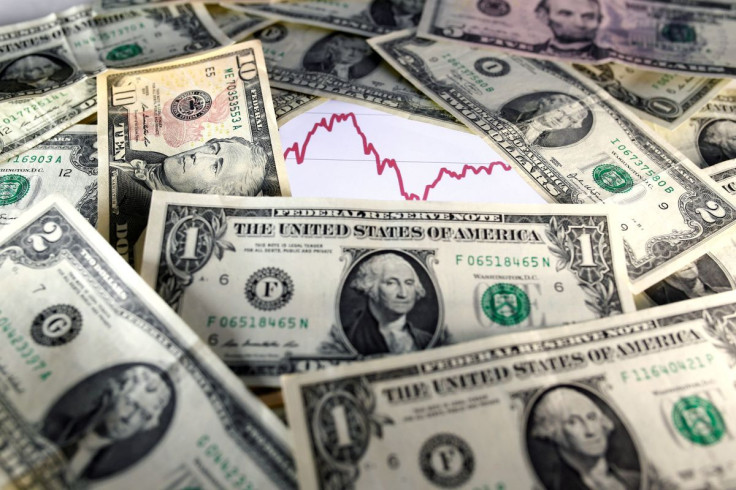Column-Ebbing Dollar Reserves Only Scratch On Dominance :McGeever

The U.S. dollar's share of world currency reserves continues to ebb slowly - but reserve stashes are only one measure of its dominance of global finance, and there's no realistic scenario where that gets derailed any time soon.
Central banks and private businesses need their rainy day funds to be in liquid assets that are easily accessible, in currencies that are widely accepted and in plentiful supply, and in jurisdictions with an internationally recognized rule of law.
The dollar meets all those criteria. No other currency comes close, even though the share of central bank reserves and global trade flows is increasingly being spread across a wider range of currencies.
The International Monetary Fund's latest cut of central bank reserves shows that the dollar's slice of the pie at the end of last year - before Russia's invasion of Ukraine and freezing of Moscow's FX reserves - was 58.8%.
That's down from 59.2% the prior quarter and the lowest since comparable data were first tracked in 1999/2000. This is a long-term trend - the dollar's share of known, or 'allocated' reserves was over 70% in 2002.
Bank for International Settlements data show that the dollar was bought or sold in roughly 88% of global foreign exchange transactions in 2019. That has remained pretty steady over the past 20 years.
A U.S. Federal Reserve paper in October showed that about 60% of international and foreign currency liabilities and assets - primarily claims and loans, respectively - are denominated in dollars. This share has remained pretty stable since 2000.
On trade, around 40% of global transactions in goods are invoiced in dollars. Global trade hit a record high of $28.5 trillion in 2021, according to the United Nations Conference on Trade and Development.
The 2000-2020 period was marked by China's rise to global economic superpower, surging dollar reserves demand from Asia after the 1997 crisis, and an explosion in globalisation and cross-border capital and trade flows.
These forces will be nowhere near as strong in the next 20 years, so demand for dollars will ebb, even if only slowly and at the margins - but so too will demand for all other reserve currencies. And in the relative world of currencies, that doesn't mean the greenback will lose out.
"You still need an alternative. Don't forget, it took two World Wars and loss of Empire for sterling to lose its status as the world's No. 1 reserve currency," said Paul Donovan, chief economist at UBS Global Wealth Management.
"UNASSAILABLE"
Debate over the dollar's future reserve status has intensified, with both sides broadly represented by two leading academics - University of California, Berkeley, professor Barry Eichengreen, and Columbia University professor Adam Tooze.
Eichengreen and his colleagues argue that the dollar's unique status will gradually diminish as a more multipolar world takes shape. Central bank reserve managers have been undertaking "active portfolio diversification" into 'non-traditional' currencies for years, they said in an IMF working paper https://bit.ly/3LKM48e last month.
Tooze doesn't dispute this, but argues https://bit.ly/3ubMKxs that many of these currencies - such as Canadian and Australian dollars - are "very much part of America's extended financial security system," protected and bolstered by dollar swap lines between their central banks and the Fed.
If the United States was in direct economic or military conflict with Russia or China, it's clear which side most of these countries would be on.
The only two credible, long-term rivals to the dollar for official reserves or 'vehicle currency' use - invoicing in a currency that is neither that of the importer or exporter - are China's yuan and the euro.
But there are myriad reasons why it will take years before they are viewed as safe, liquid, and accessible as the dollar.
The euro has a shortage of high-quality assets central banks can use as a store of value, there is still no euro zone-wide government-backed asset, and some international investors may be put off by the internal politics of a 19-nation bloc.
In China's case, it could be decades - the yuan is not fully convertible overseas and it is highly doubtful Beijing would welcome the currency appreciation that would likely follow.
Joey Politano, an analyst at the U.S. Bureau of Labor Statistics and author of a personal economics blog, simply states that the dollar's reserve currency status is so strong "as to be nearly unassailable." No other country has the "proper mixture of deep capital markets, clear rule of law, massive economic size, and technological dynamism."
Related columns:
- Russia central bank freeze may hasten 'peak' world FX reserves: Mike Dolan (Reuters, March 2)
- China may balk at unnerved reserves seeking yuan: Mike Dolan (Reuters, March 18)
(The opinions expressed here are those of the author, a columnist for Reuters)
(By Jamie McGeever; Editing by Andrea Ricci)
© Copyright Thomson Reuters 2024. All rights reserved.




















